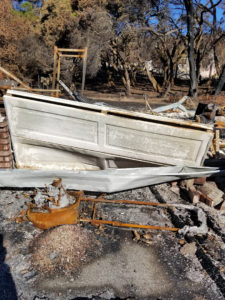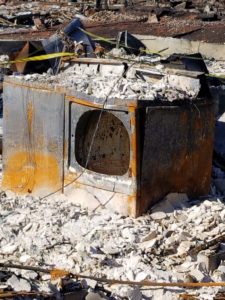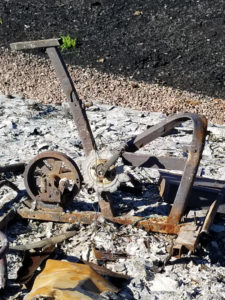
Dear Readers,
Everywhere I turn, from family to friends, to colleagues and acquaintances, I hear the following complaints and concerns:
* exhaustion * headaches * distraction * irritability * anxiety and fears * memory problems
* disorientation * sleeping issues * eating issues * depression
Not surprising that our county’s mental health director, Michael Kennedy, reports that his division is seeing a doubling in its normal volume of calls from residents experiencing anxiety and depression. These are calls from people who have lost homes in the fire and those who still have homes, but are sensitive to being in a community impacted by loss. For all of us, our community is different than it was before. There is devastation around us; and things that we thought were safe and permanent are no longer there. This is deep stuff.
And does this relate to our careers and our work lives?
You bet it does. It impacts each one of us, and it impacts the work place because we bring our full selves to work.
To help me understand the situation more deeply, I met with friend who is a local psychologist with 25+ years experience. She generously gave me information and suggestions.
The first thing she said that that everyone responds to this disaster, though we don’t necessarily respond the same way. Often, men and women respond differently, and people of different temperments and life experiences respond differently. If you’ve ever been in a disaster before, you will most probably be ‘triggered’ and at some level you will be coping with this disaster and the memories and feelings from the past.
“Although some people go headlong into working extra hard, that is only a short term distraction. It is not a good long-term solution as there is no substitute for what is really needed now: very good self-care.” She explained that self-care translates into: slow down, sleep more, eat wisely and try to lighten your load. You need to deal with your feelings about your experience with the fire. She said this is not the time to be stoic, that if you don’t take care of yourself now, and acknowledge your feelings, the stress can catch up with you in form of physical sickness and or depression.
She went on to say: “Be watchful of your own response. Try to notice if your behavior, thoughts or feelings are out of the norm for you.”
Also, managers who carried on in the immediate aftermath are possibly having delayed responses. Employees who recently moved to Sonoma County right before the fire are vulnerable as they were already dealing with major life changes.
Be gentle and patient with yourself and your co-workers. However, if you begin to feel unusually anxious, overwhelmed or even resentful toward co-workers, then speak with your manager.
Notice if you’re feeling uncharacteristically overwhelmed or distracted at work, and see if your employer has a confidential counseling program or look to community resources.
Additionally, she added, realize that the holidays are approaching and they bring their own stresses as well.
When I mentioned that I was having some uncharacteristic fatigue, she suggested I find ways to tune into my feelings so I could deal with them and express them. So I turned to photographing our community. By taking pictures of both the beauty of our natural world in Sonoma County and contrasting that with images of devastated and burned down homes and buildings, in some way I am carrying and integrating these two separate realities. I noticed I was sighing and taking deep breathes as I photographed the images of devastation. I realized that the emotions it was bringing up were exhausting, so I went to sleep very early that night. I did experience a deeper sleep than usual, and awoke the following morning with more energy.
In conclusion, here is a list of self-care strategies:
- Slow down
- Take on less.
- Try to sleep and rest more.
- Be conscious of eating healthfully and not over-eating.
- Stay hydrated.
- Stay sensitive to your moods and pause before responding in an irritable or mean way. Be gentle with yourself and others.
- Ask for help if you need it; often talking out your feelings to a trusted partner or friend can relieve stress.
- If you are aware of feeling anxious or depressed over time, talk to your manager or supervisor at work to see if you can have more breaks, a short term reduction in work, more resources to help you through or even see if there are counseling services offered through your employer.
Onward to integrating and responding to our community’s devastation.
Let’s bring our healthy selves to work!
Coach Joan.
Below are some of the images I took today, less than .5 mile from my home. Pictures of destruction, then some hope. Lastly, a perfect yellow rose from our garden.







